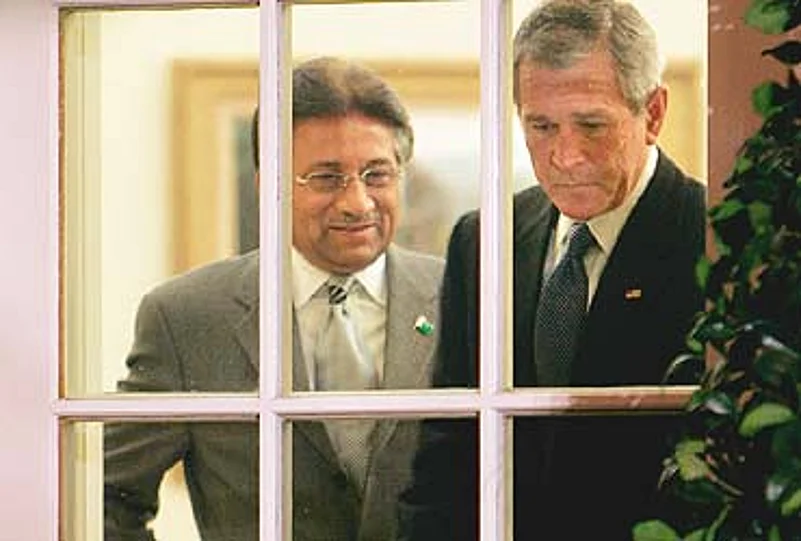
Future sales, however, will depend on whether or not Musharraf manages to satisfy the initial reader's expectations fanned so astutely. For instance, Mark Laframboise of Politics and Prose, a prominent Washington bookstore, says, "It hasn't exactly been flying off the shelves." Even Laframboise is tickled by the spectacle of a head of state making a sales pitch from the White House. "But we're living in weird times. Anything is possible," he quipped.
Sales apart, critics sarcastically remark that the memoir is packed with such self-praise and fancy anecdotes that it should have been listed under the category of fiction. Musharraf says he wrote the book to clarify what he calls "myths and perceptions", but has, in the process, concocted his own share of myths. One of these has already blown in his face. He has retracted his claim that the CIA paid millions of dollars to Islamabad to take custody of terrorists nabbed in Pakistan, accepting that this section needs to be "revised".
About matters pertaining to India and Pakistan, he need not bother about denials. He says former PM Nawaz Sharif was aware of the Pakistani army's operation in Kargil. This assertion is enough to prompt Marvin Weinbaum, a former analyst in the Bureau of Intelligence and Research at the State Department, to tell Outlook, "The general is trying to turn Kargil—this wart on his record—into a beauty mark."
All the same, Musharraf reveals that Pakistani field commanders backed the 'freedom fighters' in Kargil. Reliable Indian sources here say his confession is extremely worrying as there is no precedent of a joint operation between terrorist groups and a country's army. This confession doesn't surprise Sumit Ganguly, a professor at Indiana University. He told Outlook, "The Northern Light Infantry (the non-regular force which occupied heights in Kargil) couldn't have climbed to these heights, sustained themselves there, and have adequate firepower without the logistical support of the Pakistani army." Musharraf's contention that Kargil helped initiate the peace initiative astounds Weinbaum. "The very fact that there was a border crisis in 2001-02 belies the idea that Kargil laid the groundwork for peace," he says.
Musharraf describes Sharif's decision on July 4 to opt for a ceasefire as a "sudden capitulation" that still "remains a mystery". It was at a meeting between President Bill Clinton and Sharif that the ceasefire was decided upon. Then assistant secretary of state Karl Inderfurth told Outlook, "When Sharif contacted Clinton and said that he needed to come to Washington to see him, Clinton said, 'I can meet with you on July 4, but you know what I will ask you to do—bring the Pakistani forces back across the Line of Control'. Clinton told Sharif that if he didn't agree to do this there was no point meeting." In other words, Sharif decided on the ceasefire before he flew over to Washington—and must have taken his general's consent.
Bruce Riedel, former senior director of the National Security Council, took notes during Clinton's one-on-one meeting with Sharif. In his account of the crisis, Riedel said there had been some intelligence reporting, as late as July 3, 1999, about the "disturbing evidence that the Pakistanis were preparing their nuclear arsenals for possible deployment". But Musharraf labels as preposterous the claims that India and Pakistan were on the brink of a nuclear war.
Musharraf presents in his memoir an "out of the box" solution to the Kashmir crisis. Indian sources here say his four-step proposal (seeexcerpts) is akin to seeking revenge for 1971's humiliating surrender. His criticism of A.B. Vajpayee and Manmohan Singh prompts an Indian source to remark sardonically, "For Musharraf, it is always the other person who is out of step." As for his claim that India's uranium enrichment programme could flow from a copy of the Pakistani centrifuge design, the Indian source described it as a "commando's tactic of deception".





















